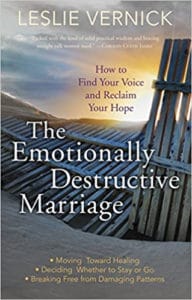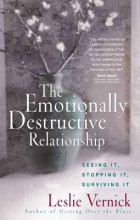
Homemade Meals for Busy Families
Mary Beth Lagerborg, co-creator of Once-A-Month-Cooking, discusses the importance of hospitality and how families can prioritize dinner time by cooking a month’s worth of healthy meals in one session.
Rescue 2x the babies from abortion!
Home » Episodes » Focus on the Family Broadcast » Reclaiming Hope and Safety in a Destructive Marriage (Part 2 of 2)
John Fuller: Today on Focus on the Family, we’ll return to a very serious problem that affects far too many marriages – interactions that damage the heart, and the mind and the spirit of your spouse.
Mrs. Leslie Vernick: She wired up her courage and we worked together on her having a very direct but respectful conversation with her husband, and this is what she told him. She said, “You know, honey, I know that you are unhappy with our sex life. And you’d like me to be more warm and responsive in the bedroom. But I just can’t manufacture those feelings when you ignore me for long periods of time, and we don’t have anything else in common. We don’t do anything together. You ignore me most of the time. And whenever I ask you for something, you shoot me down. Wouldn’t you rather have a wife who’s loving and warm and friendly in the bedroom than someone who’s just doing her wifely duty?” So, that was the question she asked him. You know what his response was? “Of course I would. But if wifely duty is all I get, it’s good enough.”
Jim Daly: Wow.
Leslie: Now, that statement completely cut her off at the knees because what he’s really saying to her is that you are an object to use, not a woman to love. And that completely crushed her spirit.
John: That’s Leslie Vernick and she’s back again as our guest today. Your host is Focus president and author, Jim Daly. And I’m John Fuller.
Jim: That’s such a heart-breaking story, John. And it points right to our selfishness and our sinfulness as human beings. Without the Holy Spirit in our lives, we can easily fall into a trap of making our marriage all about us and what we want. And as a result, we destroy the oneness that God intended for us. If you missed our conversation with Leslie last time, I hope you’ll go to our website, get a download, get the broadcast app – whatever you need to do to access this powerful content. Leslie helped us understand that abuse can happen in many different ways. There’s physical abuse, emotional abuse, verbal abuse with sarcasm and harsh words. Or abusive situations where one spouse has all of the control and the other spouse has none. We also pointed out that abuse happens to both men and women. Many of the examples we shared last time and we’ll have today will feature women as victims. And that’s true in the majority of cases of abuse. But as we acknowledged last time, abuse happens both ways. And many of the principles and advice Leslie shares from her book will work for abused husbands as well.
John: Mm-hmm. Yeah. And we can tell you more about Leslie’s book and our broadcast last time when you call 800, the letter A and the word FAMILY. 800-232-6459. Or stop by focusonthefamily.com/broadcast. Let’s go ahead and return now to part two of our conversation with counselor Leslie Vernick on today’s episode of Focus on the Family.
Jim: You’ve written a book, The Emotionally Destructive Marriage. Recap for us so those that are joining us today can understand kind of the definition for an emotionally abusive marriage. What does it look like?
Leslie: It looks like when you are regularly dismissed, deceived, dominated, degraded, or diminished. When you are regularly feeling those feelings where your spouse is doing that to you, we all may do it once in a while, but when something like that happens to you frequently in your marriage, the marriage – it becomes destructive, the marriage itself. And you become destroyed.
Jim: Oh. You talked last time about a woman’s difficulty. We – we put the qualifiers on everything last time, knowing that abuse goes both directions. And if again, don’t be too critical of us not talking about that right now, because we did talk about that last time, how sometimes the abuse goes toward the man. And I again, would just refer you back to the discussion last time to – to hear that definition. But, um, for the woman that doesn’t truly understand if she’s in that abusive relationship and she feels the way that you’re feeling, what are some of the things that she could begin to do to remedy that situation? How direct should she be with her abusive husband?
Leslie: Well, I think one of the things that she needs to begin to do to build her own confidence is to – I talk about four core strengths that a woman needs to develop. And a lot of times they need to develop them before they can ever have a conversation with their husband, because they’re just too scared or they’re too weak or they’re too angry.
Jim: And these are things within herself.
Leslie: Within herself…
Jim: Okay.
Leslie: …Yes. So, the first one – I use the acronym, CORE, C-O-R-E. And the first one is, “I will be committed to honesty. I will be committed to truth-telling, both internally, like I’m not gonna lie to myself anymore, like this isn’t so bad and, you know, maybe he’s gonna be different and I should just pray harder. I’ve done all that and it didn’t work, and insanity is doing the same thing over and over again, hoping things will be different. And so, you’re committed to truth, both in your own spirit, like maybe this is really getting to me and I’m starting to take it out on my kids. You know, you’re gonna be honest with yourself and that’s the first step, to really do the honest part. You know, I think in counseling and in the church, one of the verses that I have been so committed to is when Jeremiah warned the prophets of Israel. He said, “You heal the wounds of my people superficially by saying, ‘Peace, peace,’ when there is no peace.” And so, for people helpers listening to this, they need to understand in these kind of marriages, you need a lot of truth telling and truth seeking. You can’t just cover over things. And so, a wife has to be committed to telling the truth, both about herself and where she’s at, as well as what’s going on in her marriage. She tells the truth to herself. She’s gonna have to tell the truth to her spouse. And usually because he’s not gonna respond very well to that, she may have to tell the truth to her church. And she’s been a great master at keeping secrets and covering over and so, she’s gonna have to learn and be committed to that before she can have that discussion with her husband.
Jim: I think that’s sound advice. And we talked last time about the, uh, description of the emotionally abusive relationship, so again, if you didn’t hear that, go back, and listen to that. Let’s talk for a moment about what a healthy and good relationship looks like though, ’cause we need to paint that picture. When couples and I think it’s inevitable, Leslie, you’re gonna hit some hard times. We talked last time about the grade in marriage. I mean, every marriage is all over the place. You get an A-plus for some things and maybe a D-minus for other things and you average a C or a B-minus, something like that. That’s just the natural development in marriage and in a relationship. But in that context, where are the A grades? How – when are we doing it well? When a woman comes to her husband and says what? “Here’s what I’m feeling.” What does a healthy relationship look like?
Leslie: There are three qualities that every healthy relationship must embody and if they don’t embody these three qualities, it doesn’t matter whether you’re a Christian or not a Christian, if you don’t embody these three qualities, you will not have a healthy relationship and it could even become destructive. And the first is mutuality. Both people in the relationship have to give something into the relationship to make it work. In a marriage, both people have to give honesty. They have to give caring. They have to give respect and both people have to give responsibility. In other words, I am gonna take some responsibility for the care and the maintenance of this relationship. And both people have to be willing to be repentant when they mess up. And if both people aren’t doing that mutually in the relationship, the relationship is gonna either stagnate or it’s gonna fall apart. I’m working with a woman right now, where her husband feels he has absolutely no responsibility in the marriage to do anything other than be a provider. He doesn’t need to talk to her. He doesn’t need to be nice to her. He doesn’t need to love her. All he needs to do is be a paycheck, which is a horrible role for a husband just to be an object and a paycheck. But he doesn’t want to do anything else. And she feels like she’s shriveling up and dying, like she’s in a desert. She has plenty of money, but she has nothing else in the marriage. And so, there’s no mutual in this relationship. So, that’s the first ingredient. The second ingredient is, there needs to be reciprocity and what I mean by that is, that the power and responsibility are shared, and I’ll give you a story about that and I’m gonna make up names. But a client of mine was a full-time wage earner. She worked outside the home. She made a good salary She didn’t make as much as her husband made and so, he required her to deposit her entire paycheck into the account, but he only deposited the same amount in the account, because he wanted it to be even. But he required her to be absolutely accountable for every penny she spent, but he always had reasons why he could spend the money, because he was the head and he could do what he wanted. And so, he didn’t have to account for his money, but she had to account for her money. She had no power over their money. He had the power over the money. She couldn’t make a decision, what to do with their money. He made that decision. In addition, he had this other account where all of the rest of his money went that was not – had no name on it for her. She had no access to it, and she had absolutely no idea how much money he made. So, there was a financial lack of reciprocity and he used money to exercise control over her in an abusive way by limiting her freedom and her choices. And so, that was an abusive relationship, even though he didn’t use words; he used money to abuse and control her. And so, that was a lack of reciprocity. And then the third important ingredients – so mutuality, reciprocity – and the third ingredient is freedom. And I don’t mean the kind of freedom you can do whatever you want with no consequences. What I mean is, each individual in the marriage needs the freedom to be themselves. And when you’re trying to control and make another person into what you want them to be and they don’t have the freedom to be the person that God calls them to be or they don’t have the freedom to disagree or they don’t have the freedom to have a voice and give their own opinion or say they don’t like something without a heavy price to pay, it is not a healthy relationship.
Jim: And – and Leslie, in that regard, those are three excellent attributes, which actually are so scriptural, that when we apply them, even when the world applies them, they work.
Leslie: They work.
Jim: And that – when – I would say when you’re looking even at, uh, non-Christian counseling, those truisms are gonna be there, because they’re biblically based and, uh, you know, that should give us great hope, that we have the tools. Whether we pick the tools up and use them is the question. Let me come back to something you said, because I think it’s so critical. Power and control keep coming through in the themes that you’re describing. And it’s the abuse of those things and it tends to land in this murky place called “submission” and the definition that we give it. There’s probably as many definitions to submission as there are denominations in the church which probably explains the problem with it. What is the right way, the biblical way for us to view this idea of submission? And what does it actually mean?
Leslie: Well, I think before we can even talk about the actual biblical definition of submission, we oughta clarify what headship means, too. And Jesus actually modeled both headship and submission for us so that we would be crystal clear what it meant. And so, in modeling headship, what Jesus did is instead of wielding His mighty power, which He was certainly capable of doing – He was an authority; He was the Son of God; He could’ve done all kinds of fabulous things like hit people with lightning bolts (Laughing) and He could’ve shown His headship in that way.
Jim: In fact, He said it to Pontius Pilate.
Leslie: He could’ve done that.
Jim: You know, My Father could send an army.
Leslie: But He didn’t model headship that way. In fact, for His disciples, how He modeled headship was He put a towel around Him, and He got a bowl of water and He washed their dirty feet. And He told His disciples that this is what I’m showing you headship looks like. It doesn’t mean you get your way. It doesn’t mean you get to go first. It means that you get to be the servant and you get to lead in servanthood. And yet, His disciples were so like unclear about that, just a few verses later after He modeled that wonderful example, they’re arguing who’s gonna get the first seat in heaven.
Jim: (Chuckling) Right.
Leslie: And so, Jesus again says to them, “You know the Gentiles? You know how they use their authority and they lord it over people?” Jesus says, “Not so with you. If you want to be the head, you get to be the servant.” And so, headship, biblically, is defined is, if you want to be the head, you get to be the example of sacrificial servanthood first.
Jim: Hm.
Leslie: You get to initiate that. That’s what biblical headship means. And so, when a husband or a church says, a husband gets his way and he gets to dominate and control another person, the scriptural words for that is, bullying or selfishness. It’s not headship. And Jesus also modeled submission when He willingly gave Himself to His Father’s will. Jesus always is described as wanting to do what God wanted Him to do. But in one time, He didn’t want to do what God wanted Him to do and that was in the Garden of Gethsemane. He said, “If anything could happen that we could do this a different way, I would rather have it done a different way. And yet, I’m willing to do what You want, God.”
Jim: Yeah.
Leslie: And so, submission is when some person or a male or female willingly gives her will to another. And so, submission is only done by the person who chooses to do it and you can’t force someone to submit.
Jim: And, Leslie, you’re saying that very clearly. Yet, we live life kind of between boundaries and sometimes it’s grey where that boundary line is and where we cross over it. Help us better understand, because we want – I hope we want to live a life that is honoring the Lord and we want to be in marriages that are lifting up the Lord in those relationships. So, when we’re crossing that boundary, help us better understand where that line is. We’re always looking for the lines.
Leslie: Well, here’s one example and I – and I share this example in the book. But Bill was very controlling in Teresa’s phone use. He didn’t want her to talk on the phone when her – when he was home. In his mind, he thought, you’re a stay-at-home mom. You have all day to talk on the phone if you want. When I’m home, I want that time to be ours, not an unreasonable thought. And so, he didn’t want Teresa to use the phone at all when he was home. So, one night she sees her cell phone ringing and she looks at it and it’s her sister and she picks up the phone and she puts it over and she says, “Bill, it’s my sister. I want to get this.” And so, he looks at her with a cock in his brow, you know…
Jim: Sternly.
Leslie: …She could tell he was not happy. And so, she takes the call and she says, “My sister’s having trouble at work. She’s on her computer. She can’t figure something out. She has a deadline. I’m just gonna take a couples minutes.” Teresa knew her computer very well and was gonna help her. As soon as she got off the phone, Bill said, “Gimme your phone.” And she said, “No, I’m not gonna give you my phone.” And he said, “Give me your phone!” And they wrestled a bit and he grabbed it out of her hand, and he threw it in a sink full of soapy water. And he said, “Now you’re not gonna be able to talk on the phone when I’m at home.” Now we would think that, that was abusive. And yet, in Bill’s mind, Teresa wasn’t loving him. She wasn’t honoring his request. She wasn’t submitting to his leadership as the head of their home. And so, this gets very murky, because we have to ask the question, does a husband have the right to dictate someone’s decisions? I – I can’t talk on the phone if I feel it’s an emergency and I don’t have the right to prioritize my sister’s needs for attention in the moment over your needs for me to sit and watch TV with you. And so, this can become very sticky and very murky for pastors, counselors who’ve got Bill and Teresa sitting before them. And Bill is saying, “You know, I shouldn’t have thrown her phone, but after all, she should’ve been listening to me because I’m the head – husband and I already told her I didn’t want her talking when she wasn’t on the phone. She doesn’t love me very well if she’s doing this.” And it gets just murky and confusing and who’s right and who’s wrong and who has the freedom to say, “I want to talk to my sister right now.” Doesn’t Teresa as an adult woman have the freedom to make that choice? Or does Bill as the head, get to dictate her phone use?
Jim: Well, and Leslie, that really goes back to the fundamental value, which is – for us as Christians to lay down our lives as husbands. That’s very specific in the Scripture. Meaning you lay your self-interest down in the interest of your spouse.
Leslie: Right.
Jim: And when you’re doing that in a healthy way – and that’s not being abused by the spouse – um, really your relationship will be godly. Things will flow from it. Fruit will flow from it. They’ll be a healthy aroma in that relationship. And that’s what you’re driving at, isn’t it?
Leslie: Right. When there’s mutual submission, and mutual sacrifice, and mutual giving for the welfare of each other, it works great. The problem is…
Jim: And that’s what Jesus was saying.
Leslie: That’s right. And that’s actually what Paul was saying, too. Is that when he’s giving the marital duty laws, he saying – because wives traditionally in the hierarchal culture always had to submit. So, that was nothing new even to non-Christians. The radical, new thing was, hey husbands, you have some responsibility, too. And he was trying to make it more mutual and more reciprocal. He wasn’t just saying, “Hey, husbands, you get all the goodies and the wife has to do all the work.” He’s saying, “Hey, you’ve got some responsibility here, too. And so, Paul and Jesus were saying something very radical for that time.
John: Our guest today on Focus on the Family is Leslie Vernick and she’s written a book called The Emotionally Destructive Marriage. And we’ll recommend you check that out at focusonthefamily.com/broadcast. Here now is the rest of our conversation with Leslie on today’s Focus on the Family as I asked her this question. Leslie, we’ve – we’ve got a few minutes left for you to address the woman in particular, the woman who feels, you are describing my situation. That cell phone thing, that happened to me. How can she start getting some help for that?
Leslie: Like I started to say, she needs to build her core strength, which is: she’s committed to truth; she’s open to growth and she’s gonna learn what to do, because she’s not gonna learn that overnight. She’s gonna be responsible for her own reactions to destructive behaviors, because so often, once a woman begins to wake up and realize, oh, my gosh, this is me, she starts to get pretty harsh herself in her desire to have the freedom to say what she needs to say. And so, she’s gonna be responsible for her own reactions and respectful to her husband, without dishonoring herself.
John: Hm.
Leslie: And then the last thing is, she’s gonna learn to be empathic and compassionate for her husband’s weaknesses and sins, without enabling him. And that is the key, that she can have compassion for someone and still implement tough consequences. Because consequences are gonna be an important wake-up call for him and without the pain of consequences, he will not be motivated to change.
Jim: Hm. And, Leslie, I would only add to that, in terms of the observation on the husband’s part, um, hopefully, there’s self-revelation that occurs. Hopefully, listening to today’s program and last time, that I do lean in that direction. It does seem to describe some of my behavior, maybe not all. And like I said, you know, these are choices that we live between these boundaries. And maybe we’ve chosen un – unwisely at times as husbands, to verbally attack our wives. What can we do to arrest that kind of behavior? What should we do tonight when we go home, if we recognize that in ourselves? How should we speak to our wives?
Leslie: Let me give the man who’s listening to this broadcast, who may be recognizing, wow, maybe she’s speaking about me, um, five things that they can do. And one is, to get clarity, to begin to understand that maybe you are abusive, and you are living in an abusive marriage and your wife has just about had it. And that doesn’t mean that it has to come to divorce if you’re willing to change and you’re willing to do something different. So, the next step would be, I’m committed to doing something different. You know, when I talked about abusing my child in the broadcast that I did on emotionally destructive relationships, I was committed, once I saw that I had the same capacity as my mother to be abusive, that I was never gonna do that again and I was committed to do whatever I had to do to change, to not repeat that destructive behavior. So, that’s the second step. The third is, that you need to confess. You need to open up and talk to your wife and say, “I see some things that I’ve never seen before, and I am willing to do what I need to do to get help.” The fourth thing is, that you need community around you, because you cannot do this change by yourself. God never…
Jim: And that means accountability.
Leslie: Yes, that means accountability; that means other men in your life who can speak into your life, that you’re willing to listen and that you’re willing to hear your wife’s feedback when she says to you, “You’re doing it again,” that you’re allowing that community. Hebrews 3:13 says that we all have the capacity to be deceived and so, that we need one another to speak into our lives. And so, you are gonna invite community. And the last thing that you’re gonna understand is, there are consequences. If you refuse to change and you keep doing the same thing you’ve always done, there are gonna be painful consequences, not to hurt you, but to help you wake up.
John: Leslie, back to the, uh, the illustration of the husband throwing the phone into the sink. Um, you described some things that, that particular woman might have done. How – how could she possibly respond respectfully? And what kind of consequences can she give him for treating her like that? I mean, really it was way over the line, and it was abusive.
Leslie: You know, in those situations it might not be that she has any power to do any consequence in that moment. But it might be that she begins to speak up and say, “What you did was unacceptable. If you ever do that again, I won’t be able to live with you, because you’ve just created a – an abusive situation that’s destructive to me, to our children who are watching and to our marriage. And I love you too much to allow you to continue doing that without you understanding how damaging that is. And so, I don’t feel safe with you anymore.” And we’ve talked about safety. We haven’t talked as much about safety as I’d like to, but safety is an important component to God and sometimes we think the sanctity of keeping a marriage together at all costs and any price is more important than the safety of the individuals in the marriage. And when someone chronically feels unsafe, whether it’s emotionally unsafe, physically unsafe, sexually unsafe, financially unsafe, or spiritually unsafe, they may have to create some distance. And that may include separating for a season, not to punish, but to help someone wake up, that you do not get the perks of a good relationship without doing the work.
Jim: Hm.
John: Hm.
Jim: And that’s important. I think we need to put that emphasis on that safety factor. Uh, just go ahead and speak to that beyond, um, the obvious, but define that for us. What should a woman do who feels unsafe?
Leslie: Well, let me just put some biblical parameters around there, because I think sometimes when women feel guilty taking measures to be safe when they think, oh, I should just stay and you know, try to put up with it. The Bible says in Proverbs, I think 27, “the prudent see danger and take refuge.” And so, some examples, although God says to us that we are to obey authorities over us, when David knew that Saul was seeking to harm him, he didn’t just pray; he fled.
Jim: Right.
Leslie: And when Jesus – baby Jesus was being, um, sought after Herod, who was in authority over Joseph, but God woke Joseph up in a dream and didn’t say, “Don’t worry, Joseph. I’ll take care of you.” He said what? Get out of Dodge, he said go to Nazareth because Jesus’ safety was more important than obeying the authorities. And we all know that lying is wrong. It’s one of the Ten Commandments. And yet, when Rahab lied to save the spies, kept their safety, God commended her. She’s in the hall of fame in Hebrews 11.
John: Hm.
Leslie: And so, God values safety. And when Jesus was arguing with the Pharisees over their legalistic application of the Sabbath, He used safety. He said, “Which one of you, if you’re ox fell in the well or even your child, who wouldn’t break the rules of the Sabbath in order to rescue that ox?” And so, I think sometimes we have valued, like I said, the sanctity of marriage more than the safety of the individuals. And so, I think a woman needs to be safe and stay safe. And let me just give a less dramatic example than separation. Um, one of the women that I work with, her husband engaged in a lot of road rage. He had a lot of rage at home, too, but road rage was particularly terrifying to her and the children. And finally she said to him, you know, “You are out of control. You’re terrifying me and the children. And from now on, I refuse to drive with you. Wherever we go, I’m gonna go separately. I will not be in the car with you unless I’m the driver.”
Jim: Hm. Does she need to plan for that conversation to go poorly? You know, what…
Leslie: She does.
Jim: …If he reacts out of that anger then?
Leslie: She does. And so, I give lots and lots and lots of information about how to prep for that kind of conversation, both internally, as well as safety for you if you’re gonna have that kind of conversation, if there’s ever been any physical abuse or other kind of ramifications against you. How do you prepare for that? And so, a whole chapter is devoted to that. But one of the things I will say, is you don’t have that kind of conversation with your husband if you haven’t told other people that you’re having that kind of conversation, that you haven’t had an accountability. So, 30 minutes after I have this conversation, please call me to make sure I’m safe and that you don’t have an exit plan, so that if he starts to escalate, that you can’t get out of the house.
Jim: Leslie, that is really good advice. Let me carry that a little further. Uh, let’s say tonight someone’s heard this broadcast. Um, this wife is feeling vulnerable. She’s recognizing perhaps for the first time that she might be in that abusive situation. The lights have gone on and, uh, what would you suggest for her tonight, when they go home and they’re in the home tonight, what can she do to begin this process of healing really? And that’s what you’re talking about, how to heal the relationship. Should she say nothing and go back to the four core things and why don’t you quickly mention those once again?
Leslie: Yeah, I wouldn’t encourage her to say anything yet, because she needs to be empowered to say it wisely. You know, when we’re confronting somebody with some difficult information about themselves, um, Galatians tells us to do it wisely, that when someone’s caught in a trespass, we who are spiritual should do it gently and – and with a spirit of humility. And so, I think sometimes when we are empowered with truth, we kinda go in with guns blazing and said, “You know what? You’re an abuser. You’re a jerk and I’m not living with you anymore.” And that is likely to fall on very deaf ears if…
Jim: Well…
Leslie: …Not …
Jim: …It’ll – it’ll raise…
Leslie: It’ll…
Jim: …The exact opposite…
Leslie: Right, right.
Jim: …That you’re hoping for.
Leslie: So, if your desire is to be heard, then you need to – an action plan. I think of Queen Esther as a great example. You know, she desired to be heard. She had some very tough stuff to tell her husband, but she planned. She prayed. She prepared. She developed an action plan and even then, when the timing wasn’t right and she realized, you know, this isn’t a good day to have this conversation, she postponed it to the next day. And so, I think to help a woman have that kind of conversation she needs some prep work and it’s really important that she takes the time to do that. Meanwhile though, she can begin to educate herself, get stronger and work on those four core things: honesty, openness to growth. I’m gonna be responsible for my own reactions and respectful to my husband without dishonoring myself. And I’m gonna be empathic. I feel bad for the man he is right now, but I’m not gonna enable him to continue to stay there.
Jim: That’s some powerful advice and encouragement for anyone in a dysfunctional, abusive relationship. And it’s our prayer that those marriages can be turned around and transformed by God’s love, forgiveness, and grace. Now maybe you’ve been challenged by Leslie’s words today. There’s something going on in your life where you’re falling short and not treating your spouse the way you should. If so, you need to deal with that and get some help through your church, an accountability group, or even professional counseling. And if you’re the victim of what we’ve been describing today, I urge you to get help right away. That’s why Focus on the Family is here, to provide tools and resources for families and for you if you need them. We’ve got our team of Christian counselors. They can give you Bible-based truth for your situation. So, don’t delay. God wants to heal your heart, your spouse, and your marriage. So , contact us today to get started.
John: Our number is 800-A-FAMILY. 800, the letter A and the word FAMILY. Or stop by focusonthefamily.com/broadcast.
Jim: And I want to recommend Leslie’s book, The Emotionally Destructive Marriage, to you as well. This is such an important message for the Christian community, and we can send a copy to you when you send a gift to Focus on the Family for any amount. That’s our way of saying “thank you” for partnering with us to rescue hurting marriages and offer God’s hope to these couples. Working together, we can make a difference in their lives.
John: Join the support team and help us help marriages across the globe when you call 800, the letter A and the word FAMILY. Or stop by focusonthefamily.com/broadcast for details. Coming up next time, Deborah Pegues describes how trusting God can help you overcome your anxiety.
Teaser:
Mrs. Deborah Pegues: We can do it through Christ who strengthens us. And so, that’s what we’ve got to do, decide we’re going to have a peaceful atmosphere. I’m gonna guard my peace.

Leslie Vernick is a popular speaker, an author, a licensed clinical social worker, and a relationship coach. She has more than three decades of experience helping individuals, couples and families with her expertise on a variety of issues including personal and spiritual growth, marriage improvement, conflict resolution, depression, domestic violence, and child abuse. Leslie is the author of seven books, including her best-seller, The Emotionally Destructive Relationship, which is now in its ninth printing. She and her husband, Howard, have two grown children and three grandchildren. Learn more about Leslie by visiting her website, www.leslievernick.com.

Receive Leslie Vernick's book The Emotionally Destructive Marriage for your donation of any amount!

This practical resource helps readers to view abuse from God's perspective and embrace His freedom from the physical, emotional, spiritual, and generational effects of emotionally destructive relationships.

Visit our online store and purchase a CD of today's program for yourself or to share with a friend.

Focus on the Family offers a one-time complimentary consultation from a Christian perspective.

Where there is destructive conflict, you will often find cruelty, neglect, deception, control, indifference and even abuse.

There are distinct differences between an unhealthy exchange and verbal or emotional abuse. Married couples need to understand and recognize the differences. What are some indications of abuse?

If emotional abuse is present in your relationship, setting boundaries is crucial. If you think your safety's at stake, learn the steps to effectively set boundaries.

Leslie Vernick discusses the challenging process of forgiving someone who has abused you.

I have been separated from my husband for over two years because of his infidelity. But I'm being told that Scripture doesn't allow for "separation." Am I living in disobedience because I am not being submissive to my husband's desires for reconciliation?

I'm stuck. I separated from my husband (emotional & physical abuse), but my emotions are a mess. He's not doing anything to try to save the marriage or show that he has changed. My pastor has told me he can't help me any further. Can you?

Leslie Vernick offers a look at some of the foundational ingredients for a marriage to be healthy and why these basics are crucial if a marriage is to flourish.

Author and counselor Leslie Vernick discusses how to respond wisely and biblically when wronged by your spouse. (Part 1 of 2)

Mary Beth Lagerborg, co-creator of Once-A-Month-Cooking, discusses the importance of hospitality and how families can prioritize dinner time by cooking a month’s worth of healthy meals in one session.

Scott Klusendorf, President of The Life Training Institute and Robyn Chambers, Vice President of Advocacy for Children at Focus on the Family, share strategies and encouragement in the pro-life movement. They offer compassion for abortion-minded women and speak up for pre-born babies. (Part 2 of 2)

Scott Klusendorf, President of The Life Training Institute and Robyn Chambers, Vice President of Advocacy for Children at Focus on the Family, share strategies and encouragement in the pro-life movement. They offer compassion for abortion-minded women and speak up for pre-born babies. (Part 1 of 2)

Larnelle Harris shares stories about how God redeemed the dysfunctional past of his parents, the many African-American teachers who sacrificed their time and energy to give young men like himself a better future, and how his faithfulness to godly principles gave him greater opportunities and career success than anything else.

Amy Carroll shares how her perfectionism led to her being discontent in her marriage for over a decade, how she learned to find value in who Christ is, not in what she does, and practical ways everyone can accept the messiness of marriage and of life.

Pastor Dave Carder offers couples practical advice for protecting their marriages from adultery in a discussion based on his book Anatomy of an Affair: How Affairs, Attractions, and Addictions Develop, and How to Guard Your Marriage Against Them. (Part 1 of 2)